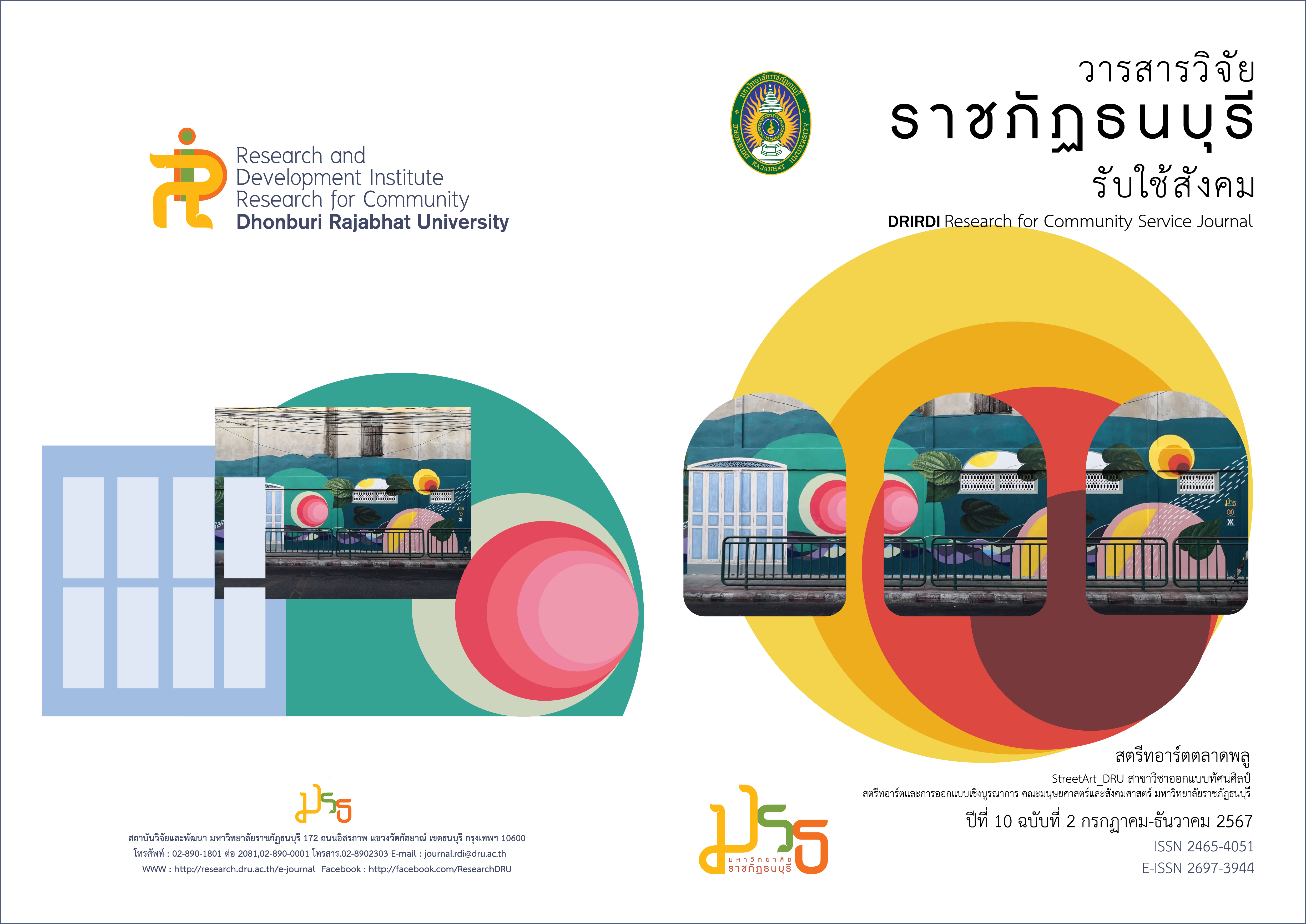การทดลองการใช้เทคนิคการใช้ปัญญาประดิษฐ์ เพื่อพัฒนาการเขียนเล่าเรื่องเป็นภาษาอังกฤษ
คำสำคัญ:
เรื่องสั้น, การใช้ปัญญาประดิษฐ์เพื่อช่วยการเขียน, ปัญญาประดิษฐ์กับการเขียนบทคัดย่อ
งานวิจัยนี้มีวัตถุประสงค์เพื่อเรียนรู้ความสามารถของปัญญาประดิษฐ์ (AI) ในการช่วยเสริมคุณภาพการเขียนเล่าเรื่อง และเพื่อทราบข้อจํากัดในความสามารถของปัญญาประดิษฐ์ โดยการศึกษาแบบทดลองด้วยการเขียนเรื่องสั้น ‘ชายชรากับแม่น้ำ’ และปรึกษาปปัญญาประดิษฐ์ไปพร้อมกัน จนเรื่องเล่านี้เสร็จสมบูรณ์
ตัวอย่างที่ใช้ในการวิจัยนี้ คือ ปัญญาประดิษฐ์ 3 แพลตฟอร์ม (platform) ได้แก่ ChatGPT, Copilot และ Monica เครื่องมือสำหรับการวิจัย คือ ปัญญาประดิษฐ์ทั้ง 3 แพลตฟอร์มดังกล่าว นำมาใช้เป็นเครื่องมือแสดงความสามารถในการตอบคำถามเกี่ยวกับการเขียน การวิเคราะห์ข้อมูล ทำการบันทึกคำถาม-คำตอบในการใช้ปัญญาประดิษฐ์ทั้ง 3 แพลตฟอร์ม ในเรื่องการใช้ภาษาอังกฤษและคำแนะนำการเขียนเรื่องสั้น (short story) เปรียบเทียบกัน และ วิเคราะห์ว่า คำตอบของปัญญาประดิษฐ์สามารถช่วยให้การเขียนเรื่องสั้นมีคุณภาพตามวิชาการการเขียนหรือไม่ และมีปัญหาในการใช้ปัญญาประดิษฐ์อย่างไร
สรุปผลการวิจัยพบว่า ปัญญาประดิษฐ์สามารถช่วยเพิ่มคุณภาพการใช้ภาษาอังกฤษในเรื่อง คำศัพท์ การสะกดคำให้ถูก การเขียนประโยคและวลี (phrase) ให้ถูกหลักไวยากรณ์ และธรรมเนียมการใช้ภาษาอังกฤษของเจ้าของภาษา ทั้งสามารถแนะนำเทคนิคการเขียนเรื่องสั้นให้มีคุณภาพรวมทั้งข้อพิจารณาการตรวจคุณภาพงานเขียนเรื่องสั้น ส่วนข้อจำกัดของความสามารถของปัญญาประดิษฐ์ได้แก่ ตอบคำถามไม่ถูกต้องในบางกรณี และไม่สามารถทราบเรื่องที่เป็นวัฒนธรรมและประเพณีไทยบางเรื่อง ทำให้แนะนำผิดทาง และข้อที่พึงระวังคือการใช้ปัญญาประดิษฐ์ให้ช่วยทำงานแทนมนุษย์มากเกินไป ทำให้ความสามารถของมนุษย์เสียไป
เอกสารอ้างอิง
AIContentfy team. (2024). The future of creative writing with AI. Retrieved on 20 October 2024, from https://aicontentfy.com/en/blog/future-of-creative-writing-with-ai
Caltech Science Exchange. (2024). Can We Trust Artificial Intelligence?. Retrieved on 21 October 2024, from https://scienceexchange.caltech.edu/topics/artificial-intelligence-research/trustworthy-ai
Ciaccio, E. J. (2023). Use of artificial intelligence in scientific paper writing. Informatics in Medicine Unlocked, 41, P.1-3.doi:10.1016/j.imu.2023.101253
Jen, S. L. and Salam, A. R. H. (2024). A Systematic Review on The Use of Artificial Intelligence in Writing. International Journal of Academic Research in Progressive Education and Development, 13(1), P.1819-1829.doi:10.6007/IJARPED/v13-i1/20584
Nagendra, K. (2023). Developing Writing Skills through English Short Stories: A Case Study in the Classroom: English Writing Skills. International Journal of Language and Literary Studies, 5(1), P.287-299.doi:10.36892/ijlls.v5i1.1243
Tshilidzi Marwala. (2024). AI is Not a High-Precision Technology, and This Has Profound Implications for the World of Work. Retrieved on 24 October 2024, from https://unu.edu/article/ai-not-high-precision-technology-and-has-profound-implications-world-work
ไฟล์ประกอบ
เผยแพร่แล้ว
รูปแบบการอ้างอิง
ฉบับ
ประเภทบทความ
สัญญาอนุญาต
ลิขสิทธิ์ (c) 2024 มหาวิทยาลัยราชภัฏธนบุรี

อนุญาตภายใต้เงื่อนไข Creative Commons Attribution-NonCommercial-NoDerivatives 4.0 International License.
บทความที่ได้รับการตีพิมพ์เป็นลิขสิทธิ์ของ มหาวิทยาลัยราชภัฏธนบุรี
ข้อความที่ปรากฏในบทความแต่ละเรื่องในวารสารวิชาการเล่มนี้เป็นความคิดเห็นส่วนตัวของผู้เขียนแต่ละท่านไม่เกี่ยวข้องกับมหาวิทยาลัยราชภัฏธนบุรีและบุคลากรท่านอื่นๆในมหาวิทยาลัยฯ แต่อย่างใด ความรับผิดชอบองค์ประกอบทั้งหมดของบทความแต่ละเรื่องเป็นของผู้เขียนแต่ละท่าน หากมีความผิดพลาดใดๆ ผู้เขียนแต่ละท่านจะรับผิดชอบบทความของตนเองแต่ผู้เดียว







